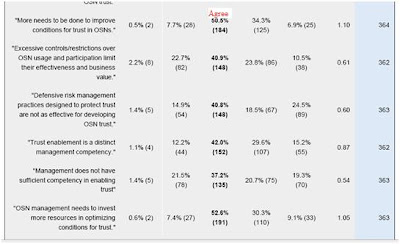The multiple ways people connect on the social web never fails to fascinate me. More important, it keeps adding to my store of knowledge about developments in the social space. A recent post on community was picked up in Social Computing Magazine, and in response I got an email from Alex Todd, CEO of Trust Enablement about their product. Trust is incredibly important in brand development—second only to a good product, it seems to me. So I researched his company with interest. The firm offers a managerial framework for building trust with key stakeholders. The stakeholder group I’m most interested in is customers, so I followed that thread. They have just conducted a survey with 366 responses that deals with what managers need to do to create trust in online social networks, broadly defined. Here’s some of the data I find most compelling. Basically it says that management needs to learn more about how to develop conditions that promote trust. Firms also need to lighten up on controlling practices that suggest lack of trust in your brand and your products (interpretation mine; obviously I feel strongly about issues of letting your customers have their say).
The firm offers a managerial framework for building trust with key stakeholders. The stakeholder group I’m most interested in is customers, so I followed that thread. They have just conducted a survey with 366 responses that deals with what managers need to do to create trust in online social networks, broadly defined. Here’s some of the data I find most compelling. Basically it says that management needs to learn more about how to develop conditions that promote trust. Firms also need to lighten up on controlling practices that suggest lack of trust in your brand and your products (interpretation mine; obviously I feel strongly about issues of letting your customers have their say). Ok, so you agree with me! How do they do it? These images are from a presentation made to
Ok, so you agree with me! How do they do it? These images are from a presentation made to MBA students at McMaster University. They have identified six factors that contribute to the development of trust. Each factor has particular impact at a given stage in the brand development process. It’s reminiscent of the old hierarchy of advertising effects and similar in tone to the new media model I set out last year. To build a trusted brand the marketer needs to move people through a process beginning with, in their words, “Discovery” and culminating in “Advocacy.” Right on.
MBA students at McMaster University. They have identified six factors that contribute to the development of trust. Each factor has particular impact at a given stage in the brand development process. It’s reminiscent of the old hierarchy of advertising effects and similar in tone to the new media model I set out last year. To build a trusted brand the marketer needs to move people through a process beginning with, in their words, “Discovery” and culminating in “Advocacy.” Right on.
How should marketers go about doing this? The resources needed for trust development are:
• Experiential sources
• Interpretive sources
• Empowerment (to make the choice)
The practices that protect trust in a brand are:
• Motives
• Proficiencies/expertise
• Risk transference.
At each stage/for each element there are specific marketing activities that can be undertaken.
There’s lots of food for thought here and more in the sources I’ve used here and many others on the Trust Enablement site. Two things seem especially useful to me. First, there is a set of stages in trust development that parallels the stages of brand development. Second, there are specific marketing activities that need to be employed in each stage to build trust.
There’s also the more general message. Enterprises/managers don’t know all they need to know, they often don’t have the appropriate attitude set, to go about building trust. They often seem to be trying to protect themselves from their customers instead. Does information and openness lead to trust? I think so!
Wednesday, October 1, 2008
Building Trust in the Social Space
Posted by MaryLou Roberts at 11:07 AM
Labels: branding, community, marketer response to social media, social media, social networks, trust
Subscribe to:
Post Comments (Atom)



No comments:
Post a Comment